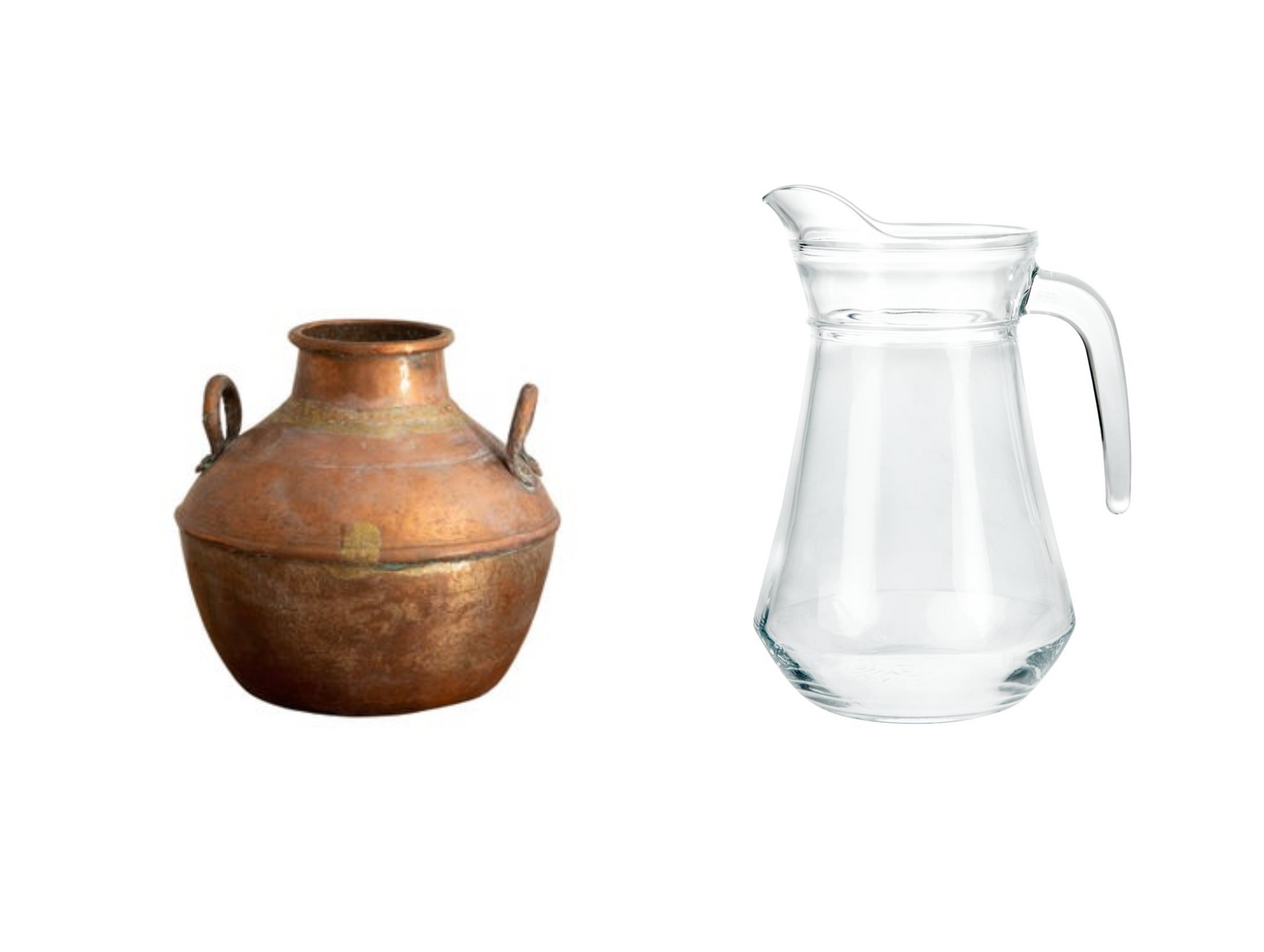

What is the best vessel to hold water?
We all know how crucial it is to stay hydrated for our well-being, but have you ever considered how you store your water? The vessel you choose doesn't just hold the water; it interacts with it and can influence its quality. In the past, earthen Matkas were common for water storage, but today, we often opt for plastic or glass bottles. However, Ayurveda suggests a more health-conscious alternative – copper vessels. Let's explore the options and learn why copper may be the best choice for storing water.
Plastic vs. Glass vs. Copper
Plastic Bottles without BPA
Pros:
- Healthier than plastic bottles with BPA, which can lead to various health issues such as male impotence, heart disease, breast cancer, type 2 diabetes, depression and asthma
- Environmentally friendly, as they don't release BPA into water or soil, affecting wildlife and plants.
- Affordable, lightweight, durable, and convenient.
Cons:
- Might contain other harmful chemicals that can leach into water, like phthalates, antimony, and bisphenol S (BPS), which are also endocrine disruptors and may have similar or worse effects than BPA
- Require proper cleaning to prevent bacterial growth.
- Contribute to plastic pollution if not recycled correctly.
Glass Bottles
Pros:
- Inert material, so it doesn't affect water quality
- Safe if lead and cadmium-free.
Cons:
- Fragile and prone to breaking.
- You can't reuse broken glass bottles.
Copper Vessels
Pros:
- Acts as a natural steriliser, eliminating harmful pathogens in water
- Supply essential copper to the body, promoting health benefits.
- Regulate cholesterol, heart rate, blood pressure, thyroid function, joint pain, fertility, haemoglobin synthesis and pH balance.
- Durable, with no risk of breakage if not properly handled.
Drinking from copper vessels comes with benefits and risks, depending on how you use them. Copper is an essential trace mineral. The human body needs small amounts of it for various physiological processes. However, excessive or improper use of copper vessels can lead to health risks.
Cons:
- Copper toxicity Consuming too much copper can lead to copper toxicity, also known as copper poisoning. Symptoms of copper toxicity may include nausea, vomiting, diarrhoea, abdominal pain, and, in severe cases, liver and kidney damage. Prolonged exposure to high levels of copper can be harmful.
- Leaching of copper Copper vessels, especially those that are unlined or have a thin copper layer, can leach copper into the liquids they contain, especially with acidic liquids (e.g., citrus juices or tomato-based foods); this can lead to an increased intake of copper, which may be harmful over time.
- Allergic reactions Some individuals may be sensitive or allergic to copper. Drinking from copper vessels can trigger allergic reactions; this can manifest as skin rashes, itching, or other skin irritations.
- Contamination Copper vessels may become contaminated with harmful substances if not properly cleaned and maintained; this can include the growth of bacteria or other microorganisms, which pose health risks.
- Choosing high-quality vessels Opt for copper vessels made of high-quality, food-grade copper and have stainless steel or tin linings. The lining prevents direct contact between the liquid and the copper, reducing the risk of copper leaching.
- Avoid storing acidic foods or beverages in copper vessels
- Acidic substances can accelerate the leaching of copper. It's best to avoid storing acidic foods or drinks in copper containers.
- Clean and maintain copper vessels properly
- Regularly clean your copper vessels with mild detergents and a soft cloth to prevent the buildup of contaminants. Rinse thoroughly with water and dry them properly to avoid bacterial growth.
- Limit usage
- It's generally advisable not to rely solely on copper vessels for all your drinking needs. Moderation is key. You can use them occasionally, but consider using other materials for daily use.
- Be aware of your sensitivities.
- If you have known allergies or sensitivities to copper, it's best to avoid using copper vessels altogether
Sunlight and Water Storage
Additionally, it's essential to consider where and how you store your water. Sunlight exposure can impact water quality and safety:
Sunlight and Plastic Containers: Sunlight exposure can cause plastic containers to release harmful chemicals like BPA into the water, potentially harming your health.
Microbial Changes: Sunlight kills some bacteria and viruses, improving water quality. However, it can also promote the growth of algae and other microorganisms, affecting taste and appearance.
Physicochemical Changes: Sunlight can alter water temperature and, in turn, its chemical properties; this impacts taste and overall quality.
For optimal water storage, choose a suitable container and location. Ideally, store water in a dark, cool and dry place, using glass, stainless steel, or BPA-free plastic containers. Regular cleaning and consumption within a reasonable timeframe are vital to ensure water quality and safety.
Making informed choices about your water vessel and storage conditions is essential for maintaining good health.
















